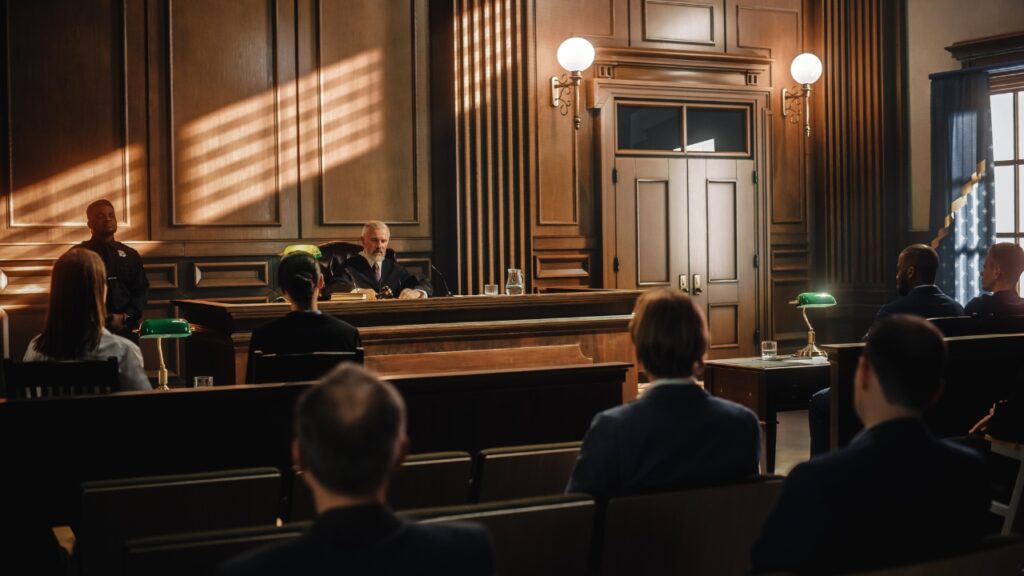Anuja Dhir: first non-white circuit judge at the Old Bailey

After a career that began with hairdressing advice and often being mistaken for a defendant when she first entered the judiciary, Anuja Dhir is now the first non-white circuit judge to sit at the Old Bailey. As she took up her new role, Dhir revealed the struggles that came with being an Asian, female barrister at the start of her career. “I got used to turning up at courts and people saying to me ‘Witness?’ – no – ‘Defendant?’ – no; and looking rather surprised when I said I was the advocate,” she has said. On one occasion, she was even asked to show her wig and gown before security allowed her into the courtroom. “Added to that, most clients did not want a young, Asian, Scottish female representing them, so that made it harder for me to build a client base,” she continued. The tables have now turned, and many defendants will now want to be in Dhir’s good books as she dons the robes of a circuit judge at the Old Bailey. She is not only the first non-white person but also the youngest to ever fill the role. It was a difficult path for her as a dyslexic Dundee schoolgirl, the 49-year-old has admitted. Teachers initially advised her to stick with hairdressing. When she was first called to the bar in 1989, most barristers were white men from public schools who already had “some connection” to the profession. “My daughter, it would never cross her mind being treated differently because she’s a female or because she’s not white, whereas in my generation we did,” she has commented. “We were surprised when people didn’t treat us differently. Not now, but when I came to the bar, I was not expecting to be treated like a white Oxbridge male at all. I’m often asked if there is a glass ceiling. I think sometimes there are two ceilings – or no glass ceiling at all. There is one glass ceiling that’s in our minds, that’s what we think we can achieve, so perhaps we impose our glass ceiling and that has happened to me several times.”
There is a lack of diversity on the bench, points out the top solicitor judge

There is a ‘dearth of solicitors’ sitting in the country’s top courts, according to the second solicitor to be appointed to the Court of Appeal. A ‘failure to recognise’ what solicitors could bring to the bench was pointed out by Lord Justice Gary Hickinbottom. The comment came during last saturday’s annual conference of The Law Society’s Junior Lawyers Division. ‘Solicitors would and do make a valuable contribution to the bench. The judiciary would benefit from having more solicitors who are able to offer a different skill set and bring different life experience,’ he said. The judge, who previously worked for McKenna & Co, now part of international firm CMS Cameron McKenna, became only the second solicitor appointed to the Court of Appeal in September last year. He also became only the fourth solicitor to be appointed as a High Court judge in 2008. It is difficult for solicitors to take on the role of judge, Hickinbottom has said. He suggests that this difficulty is down to a combination of contributing factors, including pressure from firms and a reluctance to let go of solicitors. In response to the media’s attacks on judges following the Article 50 ruling by the High Court, he continued to say that the reports were ‘personal, unfair and ill-informed’. ‘More seriously though, in my opinion, they sought to challenge the rule of law,’ he continued.
Secrets law reform means Journalists are ‘at risk of prison’

Civil servants and journalists could face imprisonment for disclosing information that would otherwise be available to anyone asking for it via the Freedom of Information Act, due to proposals by the Law Commission to reform the 1989 Official Secrets Act (OSA). This warning comes from a leading campaigner for freedom of information. Campaign groups Article 19 and Campaign for Freedom of Information (CFoI) spoke out in a joint response to the Law Commission reform proposal, saying that the modernization and simplification of the law surrounding the protection of official data ‘would go a long way towards turning the clock back towards the discredited section 2 of the 1911 Official Secrets Act.’ Originally, the criminalization of wrongful communication of information was put into effect by Section 2 of the 1911 Act, which was replaced by the 1989 version following the unsuccessful conviction by jury members of a Ministry of Defense civil servant for passing information to an MP. The Law Commission has now proposed replacing the original 1911 Official Secrets Act with a single ‘Espionage Act’. The proposals would ‘include greater safeguards for whistleblowers than under the current laws whilst also ensuring that Britain is protected in the 21st century’, the commission claimed. However, Maurice Frankel, director of the CFoI and experienced freedom of information campaigner, commented that this would ‘set the FOI Act and the Official Secrets Act on a collision course.’ According to Frankel, the laws proposed would make it an offense punishable by incarceration to leak information, which anyone could obtain already under the Freedom of Information Act. The prosecution would merely have to show that the information was ‘capable’ of causing damage to have journalists or civil servants punished. ‘A disclosure that might cause damage but is extremely unlikely to do so would become an offense under these proposals if the discloser knew or had reasonable grounds to believe that damage was possible,’ he continued.
Top QC accused of victim-blaming sex attack survivor

Top Silk has been lambasted after he placed responsibility on a victim for her sexual assault at the hands of her stepfather, a disciplinary tribunal has found. Howard Godfrey made comments that were found to be ‘offensive and unnecessary, according to the Bar Tribunals and Adjudication Service. The QC has been representing a client who was eventually sentenced for sexual assault after attacking his stepdaughter. Godfrey, a member of 2 Bedford Row, made the remarks as part of an appeal against the sentence back in 2015. The tribunal concluded that Godfrey’s behaviour was ‘likely to diminish the trust and confidence which the public places in the profession’ in a decision finalised last Friday. The case had been brought to the Bar Standards Board by a bar regulator. Godfrey was subsequently ordered to enrol in a training course on ‘advocacy and the vulnerable’. Godfrey is considered one of the UK’s top criminal barristers and reportedly has a reputation of being a’master strategist and supreme tactician’ according to his online profile. Following recent high-profile cases, the behaviour of lawyers in sex-related cases has become an increasingly important issue. A case involving Ched Evans, a well-known footballer, is just one example in which his conviction for rape was overturned. The victim was repeatedly and unsympathetically questioned about her past sexual activity. Lawyers who put witnesses in rape trials through gruelling ordeals of cross-examination are dying out, according to former Old Bailey Judge His Honour Peter Rook QC in an article in The Times newspaper last week. Rook put it down to a ‘massive culture change’, as cross-examination techniques have been changed so that ‘special measures’ are now available to protect vulnerable witnesses. Victims can now give recorded evidence or testify from behind screens.
Bar asks the next Government for an experienced lord chancellor

To defend the independence of the judiciary, representatives of the bar have now called for the next lord chancellor to be a person whose ‘experience is combined with the requisite authority among ministerial colleagues’ in a thinly veiled attack on Liz Truss. The Bar Council gave top priority to ‘judicial independence’ in their ‘Manifesto for Justice’, published in anticipation of the general election. They claimed that Truss ‘did not stand up for the judges who were attacked by the press as ‘enemies of the people’ and that the next government should better prove their commitment to maintaining the rule of law and judiciary independence. The manifesto also later demands ‘appropriate funding’ for the legal system, as a recent issue has arisen because ‘ solicitors and barristers who were once prepared to undertake publicly funded work are choosing not to do so because the rates of pay have become so low’. With regards to Brexit, the bar manifesto continues to state that ‘unless a strategic plan for the future of our legal services is devised and delivered, our exit from the EU will damage the international market value of the legal services sector and undermine acquired rights and protections for our citizens and our environment.’ The Conservative Party manifesto will most likely be published later in the week, with Labour following suit soon afterward.
HM Courts and Tribunals announces all-night ‘hackathon’

HM Courts and Tribunals have revealed today that they will be kicking off plans to design an online court with an all-night ‘hackathon’, to be held at a secret location in London. The announcement detailed plans to collaborate with the technology law community, Legal Geek and the Society for Computers and Law to run the event. The Online Court-building ‘hackathon’ will run from noon on the 1st of July for 24 hours, according to their event website. Teams will be partaking with a friendly yet competitive spirit’ to build ‘designs, solutions, systems, and technologies for online courts’. The idea of the ‘hackathon’ is hardly a new one. Emerging in the 1990s from the US ‘cyberpunk’ culture, the original hackathons aimed to connect interested parties to allow them to work together to solve particular problems and would traditionally be accompanied by fast food. The judiciary seems to be reviving and emulating the event and has announced that ‘pizzas and coffee will be consumed in great quantities’. It plans to run non-stop over the 24 hours, saying that ‘we expect most teams to work through the night, certainly the techies’. The event will involve the design of tools for use in online courts, such as to help litigators build legal arguments, organize digital documents, and come to settlements without the need for advisors, as well as means to achieve automated learning solutions that will retrospectively analyze data generated by the online programs to improve the system. ‘Online courts are likely to be the most significant development in our court system since the nineteenth century, enabling far greater and more affordable access to justice. This is a great opportunity to contribute to the design of online courts’, commented Professor Richard Susskind, OBE, president of the Society of Computers and Law and a keen supporter of the scheme.
Women make partnership breakthrough

Whilst international and silver circle firms have promoted more women in this year’s round of promotions, magic circle firms are behind on gender diversity. International firm Norton Rose Fulbright is among the firms leading the way on gender diversity in its senior ranks, with women making up more than a third of promotions in the latest round of partner appointments. The firm has 45 partners worldwide, including 18 women (40%). Norton Rose Fulbright, an international firm, is among those paving the way for gender diversity amongst its senior ranks. In the latest round of partner appointments, women now make up more than a third of promotions. 48 lawyers have been promoted to partner across 26 offices globally by CMS, which is due to combine with Nabarro and Olswang today. 13 (27%) of those promoted are female. A further four women were promoted by Silver Circle firm Ashurst, 21% of the 19 lawyers it promoted to partners. The firm has previously said that it wants at least 40% of all partner promotions to be women by 2018. In this year’s round of promotions, magic circle firms are trailing on gender diversity. Only four of 24 new partners (17%) are women at Clifford Chance. However, one of the ‘key long-term priorities’ for the firm is to eventually balance the partnership’s gender disparity, according to a firm spokesman. It is aiming to have women make up at least 30% of its partners. Clifford Chance went on to stress that the percentage of women in the global partnership has risen from 15% to 19% since 2012, and the London partnership is now 21% female. Promotions at Clifford Chance this year will take effect on May 1st. New partners based in London are Jonathan Kewley, Matt Taylor, James Bole, Owen Lysak, Timothy Cleary and David Robson. Allen & Overy’s new partner intake was over 90% male, according to a report last week. Only two of the 24 promotions were for women. Top 50 UK firm TLT also disclosed that it had promoted eight members to partner status, and of this number three are women (37.5%).
Government bid to delay air quality plan rejected by High Court

The High Court has rejected an application made by ministers to postpone the government’s clean air plan until after the general election. They have ordered the government to publish the plan by May 9th. Citing ‘pre-election proprietary rules’, the Department for Environment, Food and Rural Affairs applied to the court to extend the publication deadline from April 24th to June 30th last Friday. The same court had previously ruled in November 2016 that they must publish the plan in April. In his judgement, Mr Justice Garnham ruled in favour of ClientEarth, a group of environmental lawyers that opposed the government’s application. He later told DEFRA to have the final plan published by July 31st, the original date of the order. Nitrogen dioxide (NO2) emissions from diesel traffic cause approximately 23,500 of the 40,000 premature deaths from air pollution each year, according to figures published by DEFRA last year. Government representative James Eadie QC told the court at the morning’s hearing that publishing the plan would be ‘like dropping a controversial bomb’ into the elections, and that a delay in publication should not affect the implementation of the proposals. Nathalie Lieven QC, representing ClientEarth, pointed out that air quality was ‘a huge issue of public concern’ and that the six-week delay would still have significant effects, as air pollution is linked to hundreds of deaths per week. Judge Garnham rejected the government’s argument that delaying the publication of plans would not delay the implementation of the clean air measures. According to figures from the Royal Colleges of Physicians and Paediatrics and Child Health, outdoor air pollution contributes to 40,000 premature deaths a year in the UK. The European Commission issued a final warning to the UK over breaches of the EU air pollution limits in February. The government’s failure to act on air pollution has been condemned by the Labour Party, who have labelled it a ‘public health emergency’.
Divorce ruling set to encourage consideration of marriage length

A family lawyer has warned that a potentially groundbreaking court ruling could have a major effect on divorce cases involving so-called ‘short marriages’ in the future. The case in question is brought by Julie Sharp, an energy trader, who is challenging a judgment that gave £ 2.74 million to her ex-husband based on the equal division of assets. The marriage lasted four years, during which time she did not have children with him. The key question, in this case, is not the defendant’s gender but the actual length of the marriage and whether it is reason enough to challenge the long-standing rule of dividing the matrimonial pot in half, according to the head of the family at Mayfair firm Forsters, Jo Edwards. ‘Long-established case law demonstrates that where assets are built up during a marriage, they should be shared equally, regardless of their length. If Mrs. Sharp succeeds in overturning this judgment, it could have a significant impact on “short marriage” cases going forward, eroding the long-standing principle about the matrimonial property,’ she said. ‘This triggers the question, how short does a marriage need to be to be defined as short? And from what point is one entitled to share the money earned by the other?’ She continued to propose another way of challenging the judgment—to dispute what the court considers the matrimonial pot consists of. ‘One of the properties treated as such (and therefore subject to the sharing principle) was a property that Mrs Sharp owned before the marriage,’ she explained. ‘It was argued on Mr Sharp’s behalf that, as well as overseeing the renovation of the couple’s matrimonial home, he managed the second property, and therefore there was a pooling of resources. If Mrs. Sharp had kept the property entirely separate and managed it herself, it may have been treated as non-matrimonial and therefore less likely to be shared.’ ‘Ultimately, the surest way to ringfence assets on divorce is to enter into a pre-nuptial agreement.’
Leigh Day case finally drawing to a close

The longest-ever hearing of the Solicitors Disciplinary Tribunal is finally drawing to a close as the verdict of human rights firm Leigh Day is delivered later this week. The tribunal is set to decide whether any of the 20 allegations lodged against the firm, its senior partner Martyn Day, and its solicitors Sapna Malik and Anna Crowther are proven. The trio denies all of the charges. The decision will mark the seventh week of the hearing’s duration. The final accusation submitted before The Solicitors Regulation Authority closed its submissions stated that the respondents had ‘orchestrated’ the case and had changed their responses retroactively in response to impropriety allegations over their handling of Iraqi claims against the Ministry of Defence. A list of accomplished lawyers willing to speak for the defendants’ characters has been cited by Patricia Robertson QC, defending, who also dismissed the notion that they had breached the rules of the SRA. Allegations of late disclosure of a key document, the destruction of its translation, unlawful payments, recklessness over the conduct of a press conference and failure to act on suspicions that payments to Iraqis were bribes were all included in the list of charges. The SRA is arguing that nothing was done to explore the possibility that the payments were bribes, despite the use of the term by both Malik and Crowther in company emails; Day also received an email that contained the word. Robertson has responded by asking why such experienced solicitors would risk their livelihoods for the sake of only 10 cases. ‘You are being invited to buy into the notion that people would put a lifetime of ethical behavior on the line – and their ability to continue to practice their profession—to hang on to that handful of clients. It just doesn’t make sense,’ Robertson said. According to the prosecution, Timothy Dutton QC, the misconduct dates back to 2008 when Day partook in the hosting of a press conference that suggested inhumane killing and torture by British troops. ‘The idea that a press conference is an adjunct to litigation [and] something that will put pressure on your opponent is frankly disturbing,’ Dutton responded and added that Day had gone too far in his endorsement of ‘sensationalized’ allegations.


